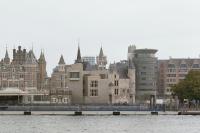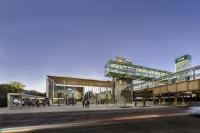YG
Kanagawa, Japan
The site is located on a gentle slope descending toward the west in the suburbs of Ebina City. When I first visited the site, I found the gentle slope to be very beautiful. We were told that the site was to be developed as a hillside, so we immediately asked that this slope be left as it was. The west side of the site has a beautiful view of the Tanzawa mountain range, while the north side is bordered by a bamboo grove of the neighboring land. On the other hand, the south and east sides of the site are crowded with houses built by a mini-development project. In other words, the north and west sides are bordered by a beautiful environment, while the south and east sides are bordered by neighboring houses, giving a sense of spatial orientation from southeast to northwest in relation to the site. The idea was to use this difference in the quality of the environment, with its diagonal drop-off between the slope and the surrounding area, in the planning of the project.
The building, which is almost square in plan, is placed in the center of the slope, with L-shaped walls on the south and east perimeters, where the neighboring houses are close by, and waist walls on the north and west perimeters, where there is a good view of the site. The height of the waist wall is lowered toward the northwest corner, creating a space in which the southeast corner is the most closed and the northwest corner is the most open. In other words, the opening of the perimeter wall creates a gradation of openness in the interior space in the diagonal direction. Because of its deep flat shape, a small court was created in the center of the building to let in light and at the same time create a circular structure of space. Around the court, the floor was placed at different levels, tracing the topography of the slope. Finally, a single-flow roof was applied in the same direction as the slope. The client did not request the creation of private rooms separated by walls, so the spaces are connected while being gently divided by the difference in floor levels. In the northwest corner, the most open space, there is a deep terrace. Surrounded by the roof and a hip wall, it is an outside room that is as close to the interior as possible. To the east, one level above the terrace is the dining room and kitchen, which enjoys a cut-away view of the bamboo grove to the north. Meanwhile, to the south is the living room, which opens to the west and offers a view of the Tanzawa mountains. The bedroom is located at the most secluded and elevated level. By raising the roof of the upper part of the bedroom toward the west, a view is secured and a terrace for drying clothes is created at the roof level. In this way, each place opens differently to the outside, thus developing a variety of places.
When there is a beautiful view, it is possible to use it as the only design cue to create a cross-sectional configuration that allows the view to be seen from all locations, for example. In this project, however, the single-sloping roof limits the areas where the view can be seen, aiming to accentuate the differences between the spaces. In the initial plan, the interior of the house had no walls except for the walls surrounding the water area, but in the final plan, there are walls in front of the entrance and on the north side of the living room. This wall was the result of a conversation with the architect, who prioritized the richness of the scene that unfolds as one moves around, with the next space always hidden in the back, rather than the immediate recognition of the entire interior space.
Rather than having a clear concept, i.e., easy to understand schematically or easy to explain verbally, we chose to enrich the space even if this was at the expense of clarity.














